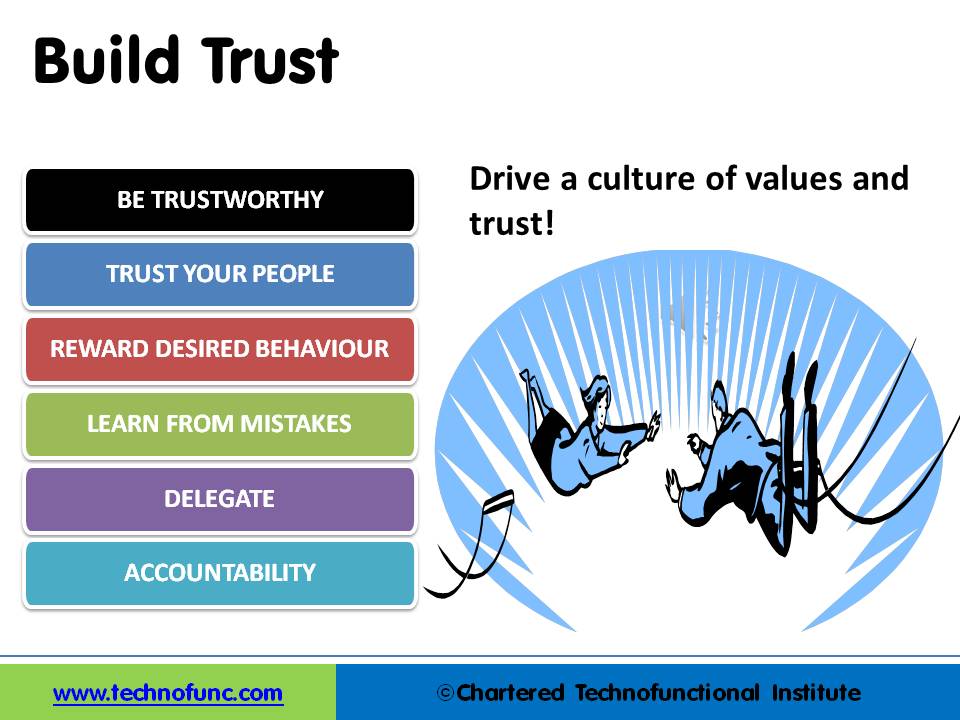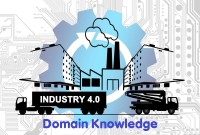- Home
- Business Processes
- Industry Knowledge
- Aerospace Industry
- Automotive Industry
- Banking Domain
- BFSI Industry
- Consumer/ FMCG Industry
- Chemicals Industry
- Engineering & Construction
- Energy Industry
- Education Domain
- Finance Domain
- Hospitality Domain
- Healthcare Industry
- Insurance Domain
- Retail Industry
- Travel and Tourism Domain
- Telecom Industry
- Leadership Skills
- eLearning
- Home
- Leadership Skills
- Career Management
- Team Development by Building Trust
Team Development by Building Trust
As your team begins to work together, you need to establish a way each team member can exchange ideas and build mutual trust. Successful groups are built on trust and collaboration. A free exchange of ideas, in an open environment, will allow your team to get to know each other and enable you to check on how they work together. Learn some tips to help build team trust and establish personal bonds.
Setting up a series of informal meetings, early on in your project, offers an ideal opportunity for team member exploration. Like other teams, your people will also most likely progress through several predictable stages of team formation and help them bond with each other, as they move from being strangers to form a cohesive team. Use this time to discuss your project, delegate particular tasks, set individual roles, and discuss objectives. Always make sure that everyone involved understands every stage of their involvement.
Use the following six-step approach to cultivate an environment of trust within your team:
1. Trust Your People
Employees will never work to their full potential if they don't feel trusted by management. Trust the intentions of your people to do the right thing. Employees who do feel trusted are higher performers and exert extra effort, going above and beyond role expectations. Trust they want to make the right decision, and make choices that, to the best of their understanding are the best and, still might work. Trusted employees feel more valued, which will help to make them feel more engaged in their work.
2. Reward Desired Behavior
Reward desired behavior by letting your team know that they will be rewarded for a job well done and supported if they run into difficulties. Make sure your team feels valued. Interact frequently and give yourself opportunities to let your team know a job is being done well. Or they will be supported and guided to do the course correct if necessary. With positive reinforcement, you add a positive reward when a person is showing desired behavior. As a team member ensure to be trustworthy and establish your credibility. Be reliable. Always try to accomplish what you say, do it on time, and without any excuses.
3. Learn from Mistakes
Generally, we all start our careers being a member of a work team, and gradually may find ourselves in a team leader role, at some point in our career. Learn from mistakes and let people learn from their mistakes. Establish a culture where people who take action and make a mistake will be viewed positively in your empowered organization. Punished learners do not learn the new skill; instead, they learn to avoid the person who punished them by taking fewer risks. Mistakes help people learn to become empowered

4. Empower & Delegate:
Most of the organizations today we work for have certainly changed from the previous traditional ways of working (such as hierarchical based organizations or functionally driven organizations) to matrix-based organizations where the relevance of team-based approaches have gained even more importance. The biggest challenge that leaders face while working with such structures is, how do they as team leaders ensure the empowerment of employees and start sharing their leadership responsibilities with the team members to maximize creativity and productivity. Delegation and trusting someone to do a job are also empowered. Demonstrate trust in others so there is a foundation for them to trust you. Always remember trust goes both ways.
5. Establish Accountability:
Once you have empowered people hold others accountable and set the expectations as early as possible. Demonstrate accountability in all your actions. Remember there is no true glory without accountability. Take the opportunity to clarify the behaviors expected of each team member. Use your Team Charter to build an understanding of team objectives. Each person should clearly understand the goals of the group and should know how these fit with your organization's overall objectives. Establish Key Performance Indicators (KPIs) linking your team's tasks to your organization's goal and objectives and use these indicators to start managing performance. Team members should be clear about the definitions of these KPIs and must understand how they affect them directly so that they understand their deliverables and how they will be measured. Provide all the needed materials and equipment to do the job effectively.
6. Provide Timely Feedback:
One of the most important roles that you have as a team manager is that of keeping individuals motivated and energized to keep working for organizational goals. Regular feedback helps employees efficiently direct their attention and energies, helps them avoid major errors and dead ends, and keeps them from learning things they later will have to unlearn at great cost. Try to tailor your efforts based on the different needs of each individual (refer to the Situational Leadership Model). Building effective teams is a continuous process – keep revisiting each step of this process on a regular basis.
Related Links
You May Also Like
-
Stress is a product of the busyness of modern life. It has assumed grave dimensions ever since the emergence of industrialism. In fact, stress is a natural, ongoing, dynamic, and interactive process that takes place as people adjust to their environment. Stress can be brought about by positive or negative life events. Distress can cause disease and eustress or positive stress can promote wellbeing and increased productivity. Learn to recognize and be responsible for your stress, and learn the ways to manage stress.
-
At different points in your professional career, it is helpful to identify your core values. Values are the qualities considered to be the most important guiding principles that determine the priorities in your life and greatly influence your career choices. Your career brings happiness when it is in agreement with the beliefs you have about what is important and meaningful to you. Awareness of your values will help you develop a clearer sense of what's most important to you in life.
-
“Level 5 Leadership”, this term was coined by Jim Collins in his book “Good to Great” and it is all about achieving "Greatness" as a leader. This article will explain what we mean by Level 5 Leadership and what the characteristics of a Level 5 leader are. What it takes to achieve greatness as a leader, and what are the steps and strategies that one can use to move up to this top level of leadership.
-
Building Your Domain Knowledge
Domain knowledge from a career management perspective encompasses the understanding of industry dynamics and business processes of the target operational area. Domain expert exhibits clear knowledge in the respective industry and understands the industry concepts in general. It is always recommended to best highlight your exposure of domain in your resume or cover letter. TechnoFunc provides you with the best tutorials to gain domain knowledge in a large number of industries and business areas.
-
Tips for Effective Time Management
After studying and analyzing how time is spent, why time is wasted, and where time is wasted you need to decide about the changes required for effective utilization of time. For this purpose, a large number of remedial measures can be taken by you. The first and foremost determinant of a planned and purposeful utilization of time is to develop consciousness of the value of time at all levels of the organization. Planning, goal setting, and defining priorities are concerns to addressed immediately.
-
Tools for Developing Your Team
If a manager has too many weak spots in the talent of the team, the ability to empower the team members to independently execute the project is impaired. Assignments fall behind schedule or stretch out because the needed skills or knowledge are not in place when needed. To successfully execute important projects, hiring talented people, and increasing the talents of existing staff are most important.
-
In our present Hitech scenario, society is changing very fast. What are the skills that are most relevant for leaders in relation to the changing economic environment? Leaders need to develop skills to drive innovation and change in order to play a more central role in their organizations’ activities. How do managers accept the change and meet business expectations by becoming a key figure in driving change and innovation?
-
Recognizing Stress & its Sources
As an individual, you almost certainly know what stress feels like. Stressors are events or situations to which people must adjust. Stressors may be physical or psychological in nature. The level of severity of stress is determined not merely by exposure but the intensity, duration, and frequency of stressors. The sources of stress are many. They arise from multiple areas both with the individual and from the environment.
-
Understanding Corporate Strategy
Management outlook and procedures have been revolutionized by more and more innovations over the recent years. It is no longer possible to follow traditional approaches to develop your organization's direction, its management as well its effectiveness. Senior managers need to be good decision-makers. In this section, we introduce concepts for strategy, strategic planning, strategic leadership, their exact meaning and associated terms, and how to use them.
-
Authentic leadership is an approach to leadership that emphasizes building the leader's legitimacy through honest relationships with followers which value their input and are built on an ethical foundation. The authentic leader acts upon his or her values and beliefs, and inspires others to do the same, is committed to know and develop oneself. Are you committed to developing yourself; know your motivations and the purpose of your leadership? Read this article to know more about authentic leadership style and discovering your authentic self.
Explore Our Free Training Articles or
Sign Up to Start With Our eLearning Courses

About Us
Learning
© 2023 TechnoFunc, All Rights Reserved










